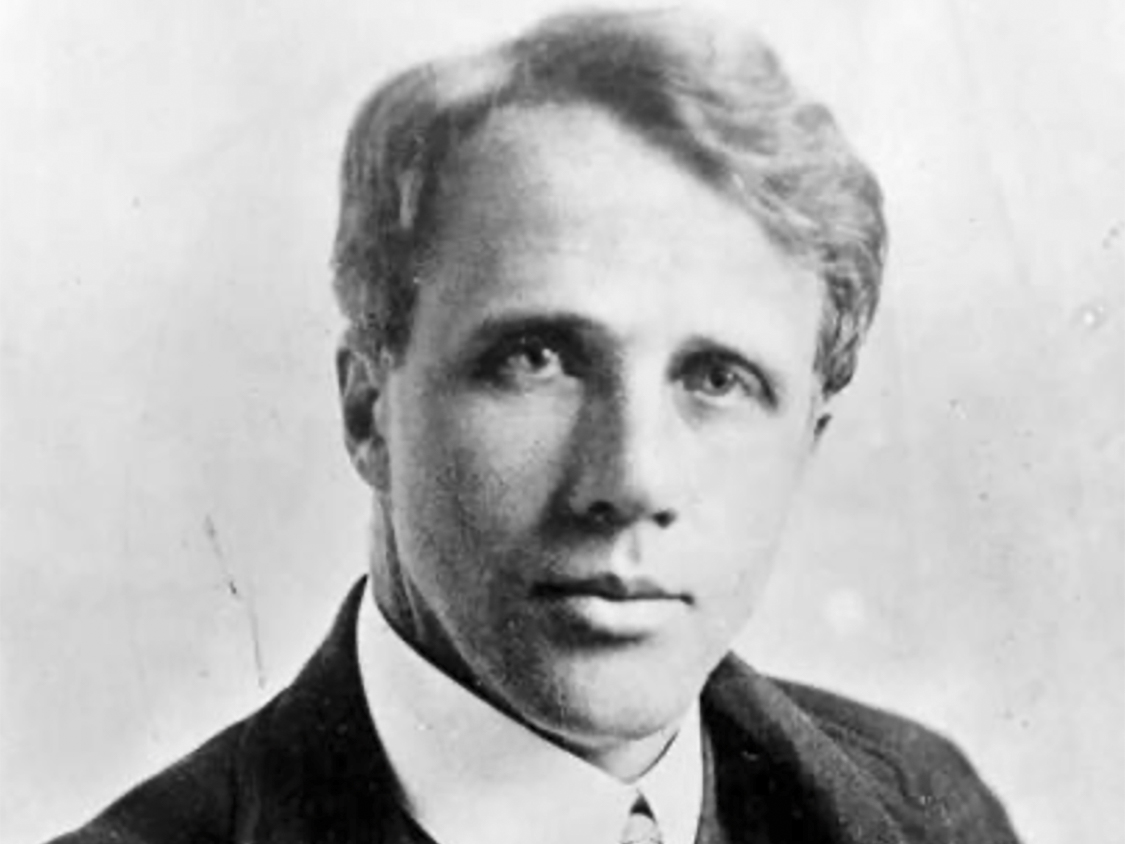The American poet Robert Frost (1874–1963), revered and celebrated in his homeland, would have been 150 years old on March 26, 2024. The work of this poet, little-known outside the United States, reflects a lifelong struggle with existential human questions and a century of US history.
Frost’s long life took place in the shadow of dramatic epoch-making events: two world wars, the Great Depression, the dropping of the atomic bomb, the Cuban Missile Crisis, etc. He took a lively interest in politics and, towards the end of his life, even found himself as an actor in the midst of world-historic events. Yet, he always remained a poet of the most intimate inwardness, in search of spirituality and the truth of faith.
Frost was born in San Francisco in 1874 and, following the early death of his father, came to New England in the northeastern United States at the age of eleven. His mother raised him and his sister in traditional religious piety. He realized early on that the world is made up of more than just matter. One of his poems, whose origins go back to his days in high school, reveals this moment of discovery. Family hardships had prompted him to ponder why human misfortune existed. He doubted that suffering and pain were part of a higher plan and that everything would turn out well in the end, as had been repeatedly emphasized by religion and especially by his mother. He realized that when souls come to Earth, each one must have voluntarily decided to undergo this trial of human existence. After ripening for a long time, these thoughts gave rise to the 1906 poem “The Trial by Existence.” Frost paints a picture of souls “in paradise” who, against their expectations of dwelling in “wide fields of asphodel forever,”1 have now agreed to a new life upon the Earth, not for the sake of any reward, for rebirth is reward enough: “. . . And where they sought without the sword / Wide fields of asphodel fore’er, / To find that the utmost reward / Of daring should be still to dare . . . .”
Here, a young poet presents the idea of reincarnation and the responsibility of the individual for their own birth. God appears as an active figure, directing events from the background and explaining why one does not remember one’s choice: “. . . But the pure fate to which you go / Admits no memory of choice, / Or the woe were not earthly woe / To which you give the assenting voice.” The poem ends: “‘Tis of the essence of life here, / Though we choose greatly, still to lack / The lasting memory at all clear, / That life has for us on the wrack / Nothing but what we somehow chose; / Thus are we wholly stripped of pride / In the pain that has but one close, / Bearing it crushed and mystified.” The memory is extinguished so that we see earthly suffering as fateful and not as self-inflicted or even self-willed.

Proceeding out from this vision, a wide range of religious, spiritual, philosophical, and theological questions weave throughout Frost’s life and work. That he was nevertheless often regarded as an atheist shows how much he kept his convictions and his striving for knowledge to himself. In addition to the ambiguity of his verses, occasional sarcasm and jeers became common features of his. For example, in the two-line poem from 1956, in which he addresses God directly: “Forgive, O Lord, my little jokes on Thee / And I’ll forgive Thy great big one on me.” Only when one knows of the hard blows of destiny in Frost’s life can we understand the depth of this seemingly light sentence. He increasingly kept his distance from church-organized religion but turned to existential themes, such as the role of the human being in a divine order of creation. According to one of his biographers, “Frost’s God is almost always the fierce Jehovah of the Book of Job and not the more gentle Elohim who visited Adam and Eve in the Garden of Eden.”2
One problem that constantly preoccupied Frost was the duality of spirit and matter. He considered the human spirit to be of divine origin and saw it as human beings’ task to permeate matter ever more deeply with spirit. He eventually addressed this in the long poem “Kitty Hawk.” His last collection of poems, In the Clearing (1962), was prefaced by 18 (of 471) lines from this poem as a maxim: “But God’s own descent / Into flesh was meant / As a demonstration / That the supreme merit / Lay in risking spirit / In substantiation. / Spirit enters flesh / And for all it’s worth / Charges into earth / In birth after birth / Ever fresh and fresh. / We may take the view / That its derring-do / Thought of in the large / Is one mighty charge / On our human part / Of the soul’s ethereal / Into the material.”3 God thus accepts the risk of putting the spirit into play in the process of creation. The spirit becoming flesh is the manifestation of this great deed.
Between Spirit and Matter
Unlike Rudolf Steiner, who arrived at a rejection of dualism and saw matter as a direct expression of the spirit, Frost held on to the contrast between spirit and matter, as well as between good and evil or right and wrong. But, by looking at both sides and accepting them, he bridges the gulf. He doesn’t say which side is the right, but, in his statements, he also never goes so far as to dissolve the opposing aspects of a phenomenon or event into one another and merge them into a unity. In the knowledge of the inseparability of polarities, he makes the in-between space transparent, so that each side also reveals itself through its antithesis. However, he refuses to side with either side. This disposition is typical of Frost’s work, in which there are countless examples of the often contradictory, multifaceted nature of human truths. For example, in “Mending Wall” from 1914, in which two neighbors walk along their common border, which is the correct view: “There where it is we do not need the wall” or “Good fences make good neighbors”? Which side is the speaker on? Does he want to build walls or tear them down? Contrary positions encounter each other here. In an interview, Frost said that he was only thinking about the impossibility of drawing sharp lines and making exact distinctions between good and bad or two abstractions. There is no rigid separation between right and wrong. “Mending Wall” merely sets up two types of people to face one another: One says, “There’s something that doesn’t like walls at all,” while the other is of the view, “Good fences, good neighbors.” Frost later confessed, “Maybe I was both fellows in this poem.”4
Choosing Paths
And which path is one to take in “The Road Not Taken” (1915/16), as one way seems so like the other? In Robert Frost’s most famous poem, a wanderer is deciding between two paths and chooses the one that he will remember in the distant future as the one “less traveled by.” “. . . Two roads diverged in a yellow wood . . . and I, / I took the one less traveled by, / And that has made all the difference.” These last lines have often influenced the interpretation of the whole poem in the sense that the “I” of the poem made the life-defining choice to go his way apart from the masses. However, the poem is so artful and subtle that readers who are not familiar with Frost’s ambiguity easily overlook that the similarity of both paths and thus the insignificance of the choice, is emphasized three times in the text just beforehand. The “difference” is an illusion. Frost seems to be praising non-conformist behavior here, but he was not a non-conformist. This well-known poem is a subtle, not easy-to-read example of the lifelong unresolved ambivalence in which he moved, between religion, tradition, and conformism on the one hand and doubt, innovation, and rebellion on the other. This contradictoriness created fertile ground for Frost’s multi-layered poetry. His most reliable anchor in the storms of doubt was his conviction that the world followed a metaphysical plan, which he once said he sometimes saw spread openly before him.
Between Bondage and Freedom
In one of his most beautiful sonnets, “The Silken Tent” from 1942, Frost also addresses a contrast. He draws the idealized picture of a woman and metaphorically relates her being to that of a silk tent: “She is as in a field a silken tent / At midday when the sunny summer breeze / Has dried the dew and all its ropes relent, / So that in guys it gently sways at ease, / And its supporting central cedar pole, / That is its pinnacle to heavenward / And signifies the sureness of the soul, / Seems to owe naught to any single cord . . . .” The contrast imprinted upon the image is that between bondage and freedom. According to Frost’s German translator Ingeborg Schimonski, the central post holding the canvas “refers to the center and the strength of the person, who binds themselves voluntarily, from out of their own strength, in order to integrate two seemingly contradictory aspirations.”5 The sonnet, built from a single sentence, ends: “But strictly held by none, is loosely bound / By countless silken ties of love and thought / To every thing on earth the compass round, / And only by one’s going slightly taut / In the capriciousness of summer air / Is of the slightest bondage made aware.”
By way of equivocality, Frost was able to shelter his innermost convictions from prying eyes and ears—and yet to express them. He rarely allowed himself to be held down to one “opinion,” but this apparent ambiguity—or indistinctness—should not be confused with arbitrariness or even a lack of a stance. Frost said once that he always despised opinions; instead, he sought ideas. I was reminded of Frost’s poetry when I found the quote from Michael Debus in Wolfgang Ritter’s article “Research on the Calendar of the Soul” in the Goetheanum Weekly6: “Whoever wants to develop esoteric forces must have learned to unite polarities within themselves because, according to Rudolf Steiner, the esotericist never thinks or speaks without striking the corresponding counter pole.” And Martin Walser also said in an interview in 1995: “Nothing is true without its opposite.”7 Robert Frost would probably have endorsed both statements.
More Robert Frost; Complete Poems of Robert Frost; In the Clearing
Translation Joshua Kelberman
Title image Robert Frost 1910. Av Ukjent/Biblioteca del Congreso. Dominio público-Merket 1.0 Universal
Footnotes
- In ancient times, the Asphodel Fields were an otherworldly world where most of the deceased dwelt between the paradisiacal Elysium and the underworld of Tartarus. Frost was very familiar with the poetry and ideas of antiquity.
- Jay Parini, Robert Frost: A Life (New York: Owl Books, 2000), p. 365.
- Robert Frost, In the Clearing (New York: Holt, Rinehart, Winston, 1962).
- Jeffrey Cramer, Robert Frost among His Poems: A Literary Companion to the Poet’s Own Biographical Contexts and Associations (Jefferson, NC: MacFarland, 1996), pp. 30–31.
- Ingeborg Schimonski, “Afterword,” in So nette Sonette: Die 28 Sonette Robert Frosts [Such nice Sonnets: Robert Frost’s 28 Sonnets] (unpublished manuscript).
- Wolfgang Ritter, “Research on the Calendar of the Soul”, the Goetheanum Weekly, July 21, 2023.
- Martin Walser, “Unsere freiesten Geister sind die reinsten Pfaffen,” [Our freest Spirits are the purest Priests] interview with Sven Michaelsen and Michael Stoessinger, “Ich habe ein Wunschpotential”: Gesprache mit Martin Walser [“I have a Wish Potential”: Conversations with Martin Walser] (Frankfurt: Suhrkamp, 1998), 93.













